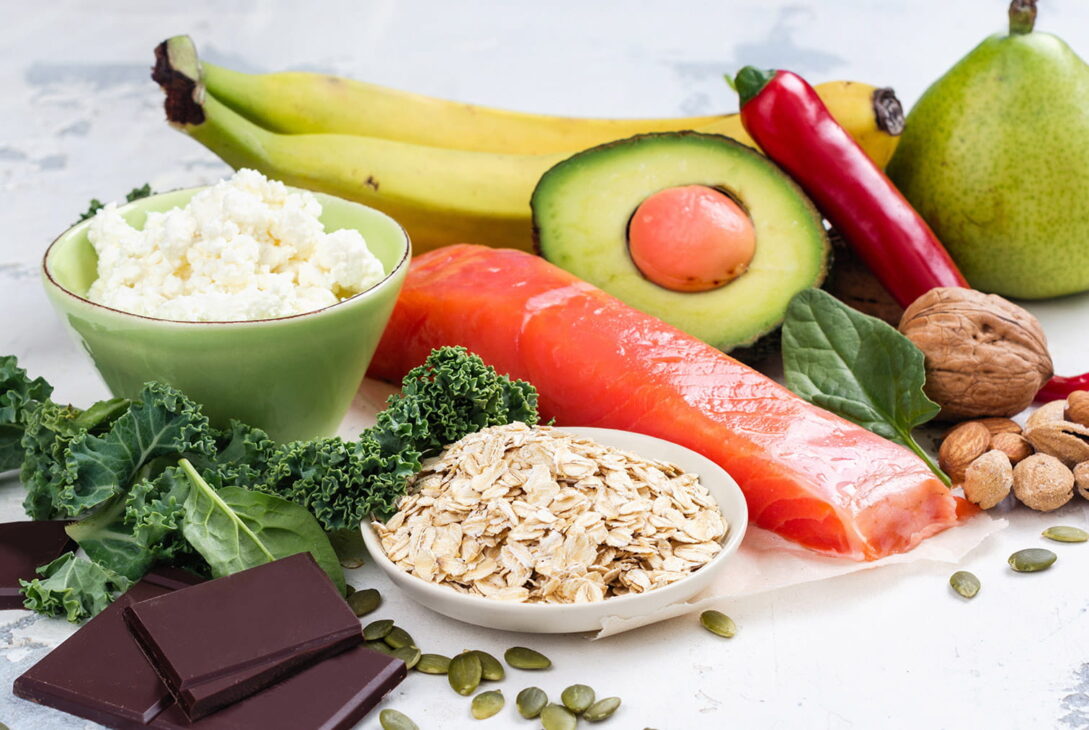Sports nutrition is the practice of consuming specific foods and supplements to optimize athletic performance. It focuses on providing the right nutrients in the right quantities to support energy production, muscle repair, and recovery.
In addition to fueling the body for physical activity, sports nutrition also emphasizes hydration strategies and timing of nutrient intake to maximize performance and promote overall health. Proper sports nutrition can help athletes reach their peak potential, enhance endurance, build muscle mass, and prevent injuries.
Given the demanding nature of athletic training and competition, understanding and implementing effective sports nutrition principles is essential for athletes looking to improve their performance and achieve their goals.
Enhance Performance With Power Foods
Enhance sports performance with the power of nutritious foods, optimizing energy levels, endurance, and recovery for peak athletic performance. Fuel your body with the right balance of proteins, carbohydrates, and essential nutrients to maximize your training and overall fitness goals.
Importance Of Nutrition For Athletic Performance
As an athlete, you know that nutrition plays a crucial role in your performance. Proper nutrition not only fuels your body but also helps prevent injuries and aids in recovery. Here are some key points to understand the importance of nutrition for athletic performance:
- Fuel for the body: The food you consume provides the energy required for your muscles to perform optimally during training and competitions.
- Enhanced endurance: Proper nutrition ensures that your body has enough glycogen stores to sustain prolonged physical activity, enabling you to push harder and last longer.
- Improved strength and power: Certain nutrients, such as protein, assist in building and repairing muscle tissues, leading to increased strength and power output.
- Enhanced recovery: Adequate nutrition helps to reduce muscle soreness and inflammation, allowing for quicker recovery between workouts or events.
- Optimal brain function: Good nutrition supports cognitive function, which is essential for making quick decisions and staying focused during intense sporting activities.
- Injury prevention: A well-balanced diet provides the necessary vitamins, minerals, and antioxidants that help strengthen bones, promote joint health, and minimize the risk of injuries.
Role Of Power Foods In Boosting Energy And Endurance
Power foods are nutrient-dense foods that provide a concentrated source of essential nutrients. They are particularly beneficial for athletes as they support energy production, enhance endurance, and aid in post-training recovery. Incorporating power foods into your diet can give you the competitive edge you need.
Here are a few examples:
- Quinoa: Packed with complex carbohydrates, quinoa provides sustained energy release, making it ideal for endurance athletes.
- Berries: Rich in antioxidants, berries help reduce muscle damage and inflammation, improving post-exercise recovery.
- Leafy greens: Spinach, kale, and other leafy greens are loaded with vitamins, minerals, and iron that contribute to optimal oxygen delivery and overall performance.
- Salmon: A great source of omega-3 fatty acids, salmon supports heart health, reduces inflammation, and aids in muscle recovery.
- Greek yogurt: High in protein and calcium, Greek yogurt promotes muscle growth, repair, and bone health.
- Nuts and seeds: Almonds, walnuts, chia seeds, and flaxseeds are excellent sources of healthy fats and provide sustained energy for endurance activities.
- Bananas: Packed with potassium, bananas aid in preventing muscle cramps and replenishing electrolytes lost through sweat.
By incorporating these power foods into your diet, you can take your athletic performance to new heights and excel in your chosen sport. Remember, consistency is key, so make sure to fuel your body with the right nutrients every day.
Optimal Nutrient Intake For Active Individuals
Optimal nutrient intake is crucial for active individuals to enhance their sports performance. A well-balanced diet tailored to an individual’s specific needs can help maximize energy levels, support muscle recovery, and improve overall athletic performance.
Sports nutrition plays a crucial role in supporting optimal performance and recovery for active individuals. Whether you’re a professional athlete or an enthusiastic gym-goer, understanding the significance of macronutrients in your diet is essential. We will delve into the role of carbohydrates, proteins, and fats in enhancing athletic performance.
Macronutrients And Their Significance In Sports Nutrition
To fuel your body for physical activity and support muscle growth and repair, it is important to have an adequate intake of macronutrients. Here’s a breakdown of the significance of carbohydrates, proteins, and fats in sports nutrition:
- Carbohydrates:
Carbohydrates are the primary source of energy for the body during exercise. They are broken down into glucose, which is stored in the muscles and liver as glycogen. Adequate carbohydrate intake helps maintain glycogen stores, delaying fatigue and enhancing endurance.
- Proteins:
Proteins play a crucial role in muscle repair, growth, and maintenance. During exercise, muscle fibers undergo damage, and consuming enough protein helps repair and rebuild these fibers. It is recommended to include high-quality protein sources such as lean meats, poultry, fish, eggs, and plant-based protein alternatives in your diet.
- Fats:
While carbohydrates are the body’s preferred energy source during moderate to high-intensity exercise, fats become an important fuel source during low-intensity activities or endurance events. Consuming healthy fats, such as avocados, nuts, seeds, and olive oil, provides essential fatty acids and aids in the absorption of fat-soluble vitamins.
Remember, each macronutrient plays a unique role in supporting athletic performance, and finding the right balance is key. It is recommended to consult with a sports nutritionist or registered dietitian to determine the optimal macronutrient intake for your specific needs and goals.
The significance of macronutrients in sports nutrition cannot be emphasized enough. Adequate carbohydrate, protein, and fat intake can help improve endurance, promote muscle repair, and optimize overall performance. So, be mindful of your macronutrient choices and let them fuel your athletic journey!
Nutritional Strategies For Pre-Workout Fuel
Discover effective nutritional strategies to fuel your pre-workout routine. Optimize performance and aid recovery with sports-specific nutrition plans tailored to your needs. Upgrade your workouts with the right fuel for maximum results.
Importance Of Pre-Workout Meals For Energy And Performance
When it comes to maximizing your workout potential, fueling your body with the right nutrients before hitting the gym is crucial. Pre-workout meals play a vital role in providing you with the energy and endurance needed to perform at your best.
Here’s why pre-workout meals are important:
- Carbohydrate fuel: Consuming carbohydrates before exercise helps replenish glycogen stores in your muscles, which serve as a primary fuel source during workouts. This ensures a steady supply of energy throughout your training session.
- Enhanced performance: Pre-workout meals can improve your athletic performance by optimizing energy levels, strength, and endurance. They help delay the onset of fatigue, allowing you to push harder and get the most out of your workout.
- Blood sugar stabilization: Properly timed pre-workout meals can help stabilize blood sugar levels, preventing energy crashes during exercise. This is particularly important for individuals with diabetes or those prone to hypoglycemia.
- Muscle preservation: Pre-workout meals can minimize muscle protein breakdown during intense exercise. By providing your body with adequate nutrients, you can help protect and preserve your hard-earned muscle mass.
- Mental focus: A well-fueled body translates to improved mental focus and concentration. Pre-workout meals provide the necessary nutrients to keep your brain alert and focused during workouts.
Now that we understand the importance of pre-workout meals, let’s delve into the power foods you should consider incorporating into your pre-exercise fueling routine.
Power Foods To Consume Before Exercise For Optimal Fueling
To optimize your pre-workout fueling, consider including the following power foods in your pre-exercise meals:
- Whole grains: Foods like oatmeal, whole wheat bread, or brown rice provide a steady release of energy due to their complex carbohydrate content.
- Lean proteins: Chicken breast, turkey, Greek yogurt, or tofu are excellent sources of protein. They help support muscle growth and repair while providing essential amino acids.
- Fruit: Fruits such as bananas, apples, or berries offer a combination of carbohydrates and natural sugars that provide quick energy without causing a spike in blood sugar levels.
- Nut butter: Peanut butter or almond butter are rich in healthy fats and proteins, providing sustained energy throughout your workout.
- Greek yogurt: High in protein and low in fat, Greek yogurt can be combined with fruits or nuts to create a balanced pre-workout snack.
- Pre-workout supplements: If necessary, certain supplements like caffeine, creatine, or beta-alanine can give you an extra boost during intense workouts. However, it’s best to consult with a healthcare professional before incorporating them.
Remember, everyone’s nutritional needs and preferences may vary, so it’s essential to listen to your body and experiment with different pre-workout meal options to find what works best for you.
Fueling your body correctly before exercise is key to maximizing your performance and achieving your fitness goals. By selecting the right power foods, you can ensure that you have the energy and nutrients necessary to give 100% during your workouts.
So, make it a priority to plan and prepare your pre-workout meals to take your fitness journey to the next level.
Hydration: Crucial Element In Sports Nutrition
Proper hydration plays a crucial role in sports nutrition, supporting optimal performance and recovery. Adequate fluid intake helps maintain body temperature, enhance endurance, and prevent fatigue, making it a vital element in athletic training and competition.
Understanding The Importance Of Hydration For Athletes
Proper hydration is a crucial element in sports nutrition for athletes. Staying hydrated not only quenches their thirst but also helps maintain their performance and overall well-being. Here’s why athletes need to prioritize hydration:
- Optimal performance: Hydration plays a vital role in ensuring athletes perform at their best. Even mild dehydration can negatively affect physical and cognitive function, leading to decreased endurance, muscle cramps, and fatigue.
- Temperature regulation: During intense physical activity, the body produces heat. Sweating is the body’s natural cooling mechanism, but it can also lead to fluid loss. By staying hydrated, athletes can regulate their body temperature and prevent overheating.
- Improved recovery: Adequate hydration aids in the post-exercise recovery process. It facilitates the delivery of essential nutrients to the muscles, helping to optimize their repair and replenishment. This, in turn, assists in reducing soreness and expediting recovery time.
- Enhanced cognitive function: Dehydration can impair brain function, leading to diminished focus, memory, and decision-making skills. By maintaining proper hydration, athletes can preserve their cognitive abilities and stay sharp during training and competition.
Hydration Strategies And Power Drinks For Maximum Performance
As athletes engage in strenuous activities, maintaining proper hydration becomes paramount. Implementing effective hydration strategies and consuming appropriate power drinks can help athletes achieve optimal performance levels. Consider the following approaches:
- Pre-hydration: Prior to physical activity, athletes should strive to consume adequate fluids to ensure they start their exercise routine properly hydrated. This may involve consuming water, sports drinks, or other hydrating beverages.
- During activity: Athletes should aim to replenish fluids during prolonged exercise sessions or intense training sessions. Regularly drinking small amounts of fluids can help replace the lost fluid through sweating and maintain optimal hydration levels.
- Post-activity replenishment: After exercise, it is crucial to replenish fluids and electrolytes lost during physical activity. Consuming hydrating beverages such as sports drinks or coconut water can be beneficial in restoring hydration levels.
- Hydration monitoring: Athletes must adopt a proactive approach to monitor their hydration status. Urine color can serve as an indicator of hydration level; light yellow urine generally suggests adequate hydration, while darker yellow urine may indicate dehydration.
Remember, the choice of power drinks should align with the individual athlete’s needs. Power drinks with a balanced electrolyte and carbohydrate content can enhance performance and aid in recovery. However, it’s essential to consult with a nutrition professional to determine the most appropriate power drink for specific requirements.
Understanding the importance of hydration and implementing effective strategies is vital for athletes to achieve maximum performance. Prioritizing proper hydration and consuming suitable power drinks can help athletes stay hydrated, improve endurance, and optimize their overall athletic performance. By taking proactive steps to maintain hydration levels, athletes can unlock their full potential and enhance their sports nutrition regimen.
The Role Of Antioxidants In Sports Nutrition
Antioxidants play a crucial role in sports nutrition by combatting oxidative stress caused by intense physical activity. These powerful compounds help enhance recovery, improve performance, and reduce muscle damage, making them essential for athletes.
Antioxidants play a crucial role in supporting athletes’ bodies and enhancing their performance. As athletes engage in intense physical activities, their bodies experience oxidative stress, which can lead to various health issues. Incorporating antioxidant-rich foods into their diet can help combat oxidative stress, boost recovery, and reduce inflammation.
Let’s dive deeper into the impact of oxidative stress on athletes and discover the powerhouse foods that can aid in their overall well-being.
The Impact Of Oxidative Stress On Athletes’ Bodies:
- Oxidative stress occurs when free radicals outnumber the body’s antioxidant defenses. Intense exercise increases the production of free radicals, which can damage cells, proteins, and DNA.
- Athletes often experience increased inflammation, muscle damage, and fatigue due to oxidative stress.
- Prolonged oxidative stress can impair recovery, hinder performance, and increase the risk of injuries.
- Antioxidants help neutralize free radicals and protect against the harmful effects of oxidative stress.
Foods Rich In Antioxidants To Boost Recovery And Reduce Inflammation:
- Berries: Blueberries, strawberries, raspberries, and blackberries are packed with antioxidants like anthocyanins, which help reduce inflammation and oxidative stress.
- Dark chocolate: This delicious treat contains flavonoids and polyphenols that have strong antioxidant properties. Opt for dark chocolate with a high cocoa content for maximum benefits.
- Leafy greens: Spinach, kale, and Swiss chard are nutrient-dense greens that provide antioxidants like vitamins C and E, as well as phytochemicals such as lutein and zeaxanthin.
- Nuts and seeds: Almonds, walnuts, flaxseeds, and chia seeds are excellent sources of antioxidants, healthy fats, and fiber. They also provide essential minerals like magnesium and selenium.
- Colorful fruits: Citrus fruits, kiwi, papaya, and mangoes are rich in vitamin C and other antioxidants, contributing to a strong immune system and reducing oxidative stress.
- Green tea: This popular beverage contains catechins, a type of antioxidant that supports recovery, reduces inflammation, and improves endurance.
- Turmeric: Curcumin, the active compound in turmeric, possesses powerful antioxidant and anti-inflammatory properties, making it an excellent choice for athletes.
- Tomatoes: Lycopene, an antioxidant found in tomatoes, has been shown to reduce exercise-induced oxidative stress and inflammation.
- Red bell peppers: These vibrant peppers are loaded with antioxidants, including vitamin C, vitamin A, and carotenoids, which support recovery and reduce oxidative stress.
By incorporating antioxidant-rich foods into their diet, athletes can support their bodies’ defenses against oxidative stress, enhance recovery, reduce inflammation, and ultimately improve their performance. Remember, fueling your body with these nutritional powerhouses can make a significant difference in your athletic journey.
Post-Workout Nutrition For Muscle Recovery
Discover the importance of post-workout nutrition for muscle recovery in sports nutrition. Properly fueling your body after a workout helps optimize recovery, repair muscles, and enhance performance. Boost your results with targeted nutrition strategies.
The Importance Of Post-Workout Meals For Muscle Repair
After an intense workout session, your body needs proper nutrition to recover and repair the muscles that were worked hard during exercise. Post-workout meals play a crucial role in supplying your body with the necessary nutrients to support muscle recovery and growth.
Here’s why post-workout nutrition is so important:
- Protein Synthesis: During exercise, muscle tissues undergo stress and micro-tears occur. Consuming protein after a workout helps stimulate muscle protein synthesis, aiding in the repair and growth of muscle fibers.
- Glycogen Replenishment: Exercise depletes glycogen stores in your muscles. Consuming carbohydrates post-workout helps replenish these energy stores. It ensures that your body has enough fuel for future workouts and prevents muscle breakdown for energy.
- Muscle Protein Breakdown Prevention: Intense workouts can lead to muscle protein breakdown. Consuming a combination of carbohydrates and protein after exercise helps reduce muscle protein breakdown and promotes muscle recovery.
Power Foods To Consume After Exercise To Enhance Recovery And Reduce Muscle Soreness
Choosing the right foods after a workout can significantly enhance your recovery process and reduce muscle soreness. Here are some power foods that you should consider incorporating into your post-workout meal:
- Lean Protein Sources: Opt for lean protein sources such as grilled chicken, salmon, tofu, Greek yogurt, or protein shakes. These foods provide the necessary amino acids to support muscle repair and growth.
- Complex Carbohydrates: Include complex carbohydrates like sweet potatoes, quinoa, brown rice, or whole-grain bread in your post-workout meal. These carbohydrates replenish glycogen stores and provide sustained energy for your body.
- Colorful Fruits and Vegetables: Add fruits and vegetables rich in antioxidants, such as berries, spinach, kale, or bell peppers, to your post-workout meal. These foods help reduce inflammation, boost immune function, and support overall recovery.
- Healthy Fats: Incorporate healthy fats from sources like avocados, nuts, seeds, or olive oil after your workout. They aid in nutrient absorption, provide energy, and support joint health.
- Hydration: Remember to rehydrate after exercise by drinking sufficient water or electrolyte-rich beverages. Hydration is essential for proper muscle function and recovery.
By including these power foods in your post-workout meal, you can enhance muscle recovery, reduce muscle soreness, and optimize your overall performance.
Remember, what you consume after your workout plays a vital role in your body’s ability to recover and prepare for the next training session. Make sure to fuel your body with the right nutrients to maximize your gains and promote optimal muscle repair.
Supplements In Sports Nutrition: Do’S And Don’Ts
Discover the essential do’s and don’ts of sports nutrition supplements. Enhance your athletic performance with expert advice on how to make the most of your supplement choices.
Understanding The Role Of Supplements In Athletic Performance
Supplements play a significant role in enhancing athletic performance by providing additional nutrients that may be lacking in a sportsman’s diet. These products are designed to provide specific benefits such as improved energy, increased endurance, and enhanced recovery. Understanding how supplements can contribute to overall sports nutrition is key to optimizing performance.
Let’s take a closer look at the do’s and don’ts when it comes to incorporating supplements into your athletic routine.
Choosing The Right Supplements And Avoiding Potential Risks:
Choosing the right supplements is essential to ensure you are maximizing their benefits while minimizing any potential risks. Here are some do’s and don’ts to keep in mind:
- Do consult with a qualified sports nutritionist or healthcare professional: Before starting any supplementation regimen, it is important to seek professional advice to identify individual needs and potential interactions with medications or existing health conditions.
- Don’t rely solely on supplements: It’s important to remember that supplements should complement a healthy and balanced diet. They should not be a substitute for real food.
- Do research and read labels: Look for supplements that are third-party tested for quality and purity. Read the labels carefully to understand the ingredients, dosage, and any potential side effects or contraindications.
- Don’t exceed recommended dosages: Taking excessive amounts of supplements can lead to adverse effects and potentially harm your health. Stick to the recommended dosage guidelines provided by the manufacturer or your healthcare professional.
- Do prioritize evidence-based supplements: Look for supplements that have been scientifically proven to be effective through research and studies. Key examples include protein powder, creatine, omega-3 fatty acids, and vitamins such as vitamin D and B12.
- Don’t fall for marketing hype: Be cautious of supplements that make unrealistic claims or promise incredible results overnight. Remember, there are no magic pills in sports nutrition.
- Do be aware of banned substances: Athletes should be cautious when choosing supplements to avoid any substances that are prohibited by anti-doping agencies. Always check the banned substance lists provided by relevant sports authorities.
- Don’t neglect the basics: Supplements should not overshadow the importance of a well-rounded sports diet. Focus on consuming a variety of nutrient-rich whole foods, including lean proteins, fruits, vegetables, whole grains, and healthy fats.
- Do monitor your progress: Keep track of your athletic performance, energy levels, and overall well-being when introducing new supplements. This will help you assess their effectiveness and make any necessary adjustments.
Understanding the role of supplements in sports nutrition can empower athletes to make informed decisions to optimize their performance while minimizing risks. By following these do’s and don’ts, you can navigate the world of supplements with confidence and ensure you are on the right path to achieving your athletic goals.
Fueling The Body For Endurance Sports
Fueling the body for endurance sports requires optimal sports nutrition. Discover how to provide the right fuel for peak performance and enhance endurance training.
Nutritional Requirements For Endurance Athletes
Endurance athletes push their bodies to the limits, requiring optimal nutrition to sustain their energy levels and support their performance. Understanding the nutritional requirements for endurance sports is crucial for athletes aiming to enhance their endurance, strength, and overall performance.
Let’s delve into the key aspects of fueling the body for endurance sports:
Nutritional Requirements For Endurance Athletes:
- Carbohydrates: Consume a diet rich in complex carbohydrates such as whole grains, fruits, and vegetables. Carbs provide the primary fuel source during endurance activities.
- Protein: Incorporate lean protein sources like chicken, fish, beans, and legumes into your diet. Protein aids in muscle repair and recovery post-training.
- Healthy fats: Include sources of healthy fats such as avocados, nuts, seeds, and olive oil. Healthy fats provide a sustained source of energy and support overall health.
- Hydration: Stay adequately hydrated to optimize performance and prevent dehydration. Consume fluids before, during, and after activity, and consider electrolyte replenishment for longer durations.
Power Foods To Sustain Energy Levels During Long-Distance Activities:
- Bananas: Packed with natural sugars and potassium, bananas provide an excellent source of sustained energy and help prevent cramping.
- Oats: High in complex carbohydrates and fiber, oats provide a slow-release source of energy, keeping you feeling full and fueled for longer.
- Chia seeds: Loaded with omega-3 fatty acids, fiber, and antioxidants, chia seeds provide a boost of sustained energy and help prevent inflammation.
- Greek yogurt: Rich in protein and calcium, Greek yogurt supports muscle recovery and provides an excellent source of energy.
- Quinoa: A complete protein source, quinoa offers a combination of carbohydrates and amino acids, ideal for endurance athletes.
Incorporating these power foods into your diet can help sustain your energy levels during long-distance activities, enhance your endurance, and support optimal performance. Remember to listen to your body and consult with a sports nutritionist or dietitian for personalized dietary recommendations.
Fueling the body for endurance sports requires a well-balanced diet that includes a variety of carbohydrates, proteins, healthy fats, and proper hydration. By meeting the nutritional requirements and incorporating power foods into your diet, you’ll be equipped to tackle your endurance activities with vigor and achieve your performance goals.
Sports Nutrition For Strength And Power Training
Sports nutrition plays a vital role in enhancing strength and power during training, providing essential nutrients to support muscle growth, energy production, and recovery. Proper nutrition fuels optimal athletic performance and helps athletes achieve their fitness goals.
Optimal Nutrition For Strength And Power Development
When it comes to strength and power training, having the right nutrition is crucial for achieving optimal results. Proper fueling not only supports muscle growth but also enhances overall performance. Here are some key factors to consider when it comes to sports nutrition for strength and power training:
- Macronutrient balance: A well-balanced diet that includes an adequate amount of protein, carbohydrates, and fats is essential for strength and power development. Each macronutrient plays a specific role in fueling the body and supporting muscle growth.
- Protein: Consuming enough protein is essential for muscle repair and growth. Aim to include lean sources of protein such as chicken, fish, tofu, or legumes in your meals to support muscle recovery and development.
- Carbohydrates: Carbohydrates are the primary source of energy for intense workouts. Including complex carbohydrates like whole grains, fruits, and vegetables in your diet provides sustained energy for your training sessions.
- Healthy fats: Don’t underestimate the importance of healthy fats in your diet. Incorporating sources like avocados, nuts, and olive oil not only aids in energy production but also supports hormone regulation and joint health.
- Timing of meals: Proper timing of meals is crucial to ensure your body has the necessary nutrients during training and recovery. Eating a balanced meal containing protein and carbohydrates about 2-3 hours before your workout can provide the fuel needed for optimal performance.
- Hydration: Hydration is often overlooked but plays a vital role in strength and power development. Don’t forget to drink enough water throughout the day to stay properly hydrated before, during, and after your workouts.
Power Foods To Support Muscle Growth And Enhance Performance
In addition to a well-balanced diet, specific power foods can further enhance muscle growth and overall performance. Consider incorporating the following foods into your nutrition plan:
- Lean meats: Lean meats like chicken, turkey, and lean beef provide high-quality protein that supports muscle repair and growth.
- Greek yogurt: Greek yogurt is not only a great source of protein but also contains probiotics that support gut health and improve nutrient absorption.
- Eggs: Eggs are a complete protein source and also contain essential vitamins and minerals. They are versatile and can be included in various meals.
- Quinoa: Quinoa is a nutrient-dense grain that provides a good amount of protein, carbohydrates, and fiber. It can be a great option for post-workout meals or as a side dish.
- Berries: Berries are packed with antioxidants that help reduce muscle inflammation and support recovery. They are also a good source of carbohydrates and fiber.
- Leafy greens: Leafy greens like spinach and kale are rich in vitamins, minerals, and antioxidants that support overall health and recovery.
- Nuts and seeds: Nuts and seeds, such as almonds, walnuts, and chia seeds, provide healthy fats and protein. They can be a convenient snack option for pre or post-workout fuel.
Remember that while these power foods can enhance your nutrition plan, individual needs may vary. It’s important to listen to your body and work with a sports nutritionist or dietitian to tailor your diet to your specific goals and requirements.
By focusing on optimal nutrition and incorporating power foods into your diet, you can fuel your strength and power training effectively. Remember to stay consistent, monitor your progress, and make adjustments as needed to maximize your performance and achieve your goals.

Credit: www.childrens.com
Sports Nutrition For Weight Management
Sports nutrition plays a crucial role in weight management, ensuring that athletes get the right balance of nutrients for optimal performance and sustainable weight loss. With a focus on healthy eating habits and tailored meal plans, sports nutrition can help athletes achieve their weight goals while fueling their bodies effectively.
Balancing Nutrition And Weight Goals In Sports Performance
Optimizing nutrition and managing weight are crucial aspects of sports performance. Finding the right balance between fueling the body for optimal athletic performance and achieving and maintaining a healthy weight can be challenging. However, with the right strategies, athletes can effectively manage their weight while ensuring their nutritional needs are met.
The following are some helpful strategies to consider:
- Establishing personalized goals: Each athlete has unique nutritional requirements and weight goals. Working with a sports nutritionist or dietitian can help athletes identify their individual needs and establish personalized goals that align with their specific sport and performance objectives.
- Monitoring calorie intake: Understanding the calorie requirements for an athlete’s specific sport and training regimen is essential. Properly fueling the body with the right amount of calories enhances performance while preventing excessive weight gain or loss. Monitoring and tracking calorie intake can help athletes maintain a healthy weight.
- Prioritizing macronutrient balance: Macronutrients, including carbohydrates, proteins, and fats, play different roles in the body. Striking the right balance is crucial for athletes looking to manage their weight effectively. Carbohydrates provide energy, proteins support muscle growth and repair, and fats aid in various bodily functions. Allocating the appropriate proportions of each macronutrient is vital for optimal performance and weight management.
- Making smart food choices: Opting for nutrient-dense foods can help athletes meet their nutritional needs while keeping calorie intake in check. Choose whole grains, lean proteins, fruits, vegetables, and healthy fats. These choices provide essential vitamins, minerals, and other key nutrients while reducing the risk of excessive weight gain.
- Meal timing and distribution: Paying attention to when and how meals are distributed throughout the day can impact weight management. Eating smaller, frequent meals can boost metabolism, prevent overeating, and assist in maintaining a healthy weight. Additionally, timing meals and snacks around training sessions can optimize performance.
- Hydration is key: Adequate hydration is integral to sports performance and weight management. Drinking plenty of water before, during, and after exercise helps maintain hydration levels, aids digestion, and supports metabolic processes. Proper hydration can also prevent the false sensation of hunger, reducing the likelihood of overeating.
- Keeping track of body composition: Monitoring changes in body composition, such as muscle mass and body fat percentage, can provide valuable insights into weight management progress. Sports performance professionals can conduct periodic assessments to guide athletes in adjusting their nutrition and training plans accordingly.
- Avoiding crash diets: Fast, restrictive diets may promise rapid weight loss, but they can be detrimental to sports performance. Crash diets often lead to muscle loss, decreased energy levels, and impaired recovery. Instead, focus on sustainable, long-term dietary changes that support performance and overall health.
- Regular physical activity: Incorporating regular physical activity into an athlete’s routine is essential for weight management and overall well-being. Engaging in both cardiovascular exercise and strength training helps maintain lean muscle mass, boosts metabolism, and supports weight goals.
- Seek professional guidance: Professional advice from sports nutrition experts is invaluable when trying to balance nutrition and weight goals for sports performance. They can provide customized recommendations and support athletes in achieving their specific objectives.
By implementing these strategies and focusing on personalized nutrition plans, athletes can strike a balance between achieving optimal weight for sport performance and meeting their nutritional needs. Remember, finding the right balance may require experimentation and adjustments along the way, but the benefits to overall athletic performance and well-being are well worth the effort.
Conclusion
Prioritizing sports nutrition is essential for athletes and active individuals to support their performance, recovery, and overall well-being. By consuming a well-balanced diet that provides adequate macronutrients and micronutrients, athletes can optimize their energy levels, build and repair muscles, and enhance their immune function.
Additionally, proper hydration is crucial for maintaining optimal performance and preventing dehydration-related complications. Sports supplements can also be utilized as a complement to a well-rounded diet to address specific nutrient needs or performance goals. It is important to consult with a registered dietitian or sports nutritionist to develop a personalized nutrition plan that meets individual needs and goals.
By incorporating these strategies into your training regimen, you can enhance your athletic performance and overall health, allowing you to reach your full potential. Remember, nutrition plays a vital role in helping athletes achieve their goals – don’t overlook its importance.

– is a health enthusiast and blogger who is passionate about sharing his knowledge and experience in the vitamin and supplement industry. With over 5 years of experience in the field, William has developed a keen eye for identifying quality products and separating fact from fiction.
Last modified: May 22, 2024









